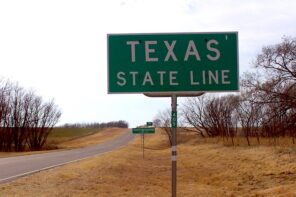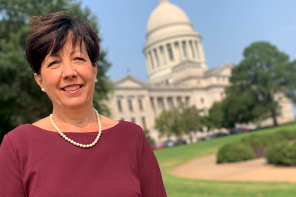“It is appropriate to teach the right of free speech, but it is also incumbent to teach the responsibilities accompanying free speech; that of accuracy, civility, truth and good taste.”
—David Barton
If any question remains about the religious and political motivations of certain members of the Texas Board of Education, one need only read the words of their social studies curriculum experts.
Rev. Peter Marshall (one of their appointed academic experts), for example, wants to restore America, according to the Web site of his Massachusetts-based ministry, “to its Bible-based foundations through preaching, teaching, and writing on America’s Christian heritage and on Christian discipleship and revival.” He also believes that Hurricane Katrina, Watergate, and the Vietnam War are the result of divine wrath.
As part of his curriculum review for the Texas Essential Knowledge and Skills process, Marshall issued an assessment of a Grade 5 history section in which students are asked to “describe the accomplishments of significant colonial leaders such as Anne Hutchinson, William Penn, John Smith, and Roger Williams.”
Marshall, along with his fellow reviewer David Barton, did not believe that students in the public education system should learn about Hutchinson:
Anne Hutchinson does not belong in the company of these eminent gentlemen. She was certainly not a significant colonial leader, and didn’t accomplish anything except getting herself exiled from the Massachusetts Bay Colony for making trouble. (emphasis added)
One of the original Puritans, Hutchinson disagreed with some of the scriptural teachings of the religious leaders and began hosting her own Bible study classes in her home. For this crime, Hutchinson was placed on trial and banished from her community. Later, she and her exiled family were killed in a Siwanoy attack.
“This is a prime example of somebody who believed in religious freedom and was persecuted for that,” said Rob Boston, a spokesman for Americans United for Separation of Church and State.
Certainly, there can be legitimate debate regarding the amount of prominence Hutchinson should receive in the Texas educational system. But describing a woman kicked out of her community for wanting to worship God in her own way as “making trouble” reveals much about what Marshall and his supporters really think about the principle of religious freedom.
The irony, of course, is that these are the same men who argue forcefully that educators must do a better job at teaching this nation’s Christian heritage.
“This is a guy talking about freedom of religion as part of the history of the United States,” said Dan Quinn of the Texas Freedom Network. “And what happened to Ann Hutchinson is why separation of church and state is so important. And now they want that example taken out of the standards.”
“It’s a perfect example of censoring ideas you don’t like and distorting history to feed an agenda.”
Panel Leaders
Just as a handful of the 15 members of the Texas Board of Education tried to hijack the educational review of the state science curriculum this past year (attempting to stack the panel of experts with anti-science activists and intelligent design advocates like Stephen Meyer of the Discovery Institute), the same board members are now trying to repeat the process with the social studies curriculum.
The outcome of these hearings will be used by publishers to determine what goes into their textbooks. As the second-largest bulk purchaser of textbooks in the country, Texas determines what students learn not only in Texas, but in many other states, where districts purchase the same versions.
The board members have appointed six experts, and, the choices appear carefully crafted to be fair and balanced to differing views: one side representing a commitment to sound education, and the other side representing an agenda of religious far-right extremism.
In addition to Marshall, who holds a seminary degree from Princeton and has no background in social science, they include:
David Barton, whose company, WallBuilders, helped spawn a cottage industry based on the concepts that “separation of church and state is a myth” and that our nation’s founding fathers wanted America to be a theocracy, governed by Christian principles. A self-styled historian, Barton only has an undergraduate degree in religious education. And Daniel Dreisbach, a professor in the School of Public Affairs at American University in Washington DC, who earned a law degree and a doctorate of philosophy in politics. While unlike Marshall or Barton he does at least boast some credentials, Dreisbach also believes “separation of church and state is a myth.”
On the other hand, the three other board members, Jim Kracht, professor of teaching, learning, and culture and also of geography at Texas A&M University; Jesus Francisco de la Teja, professor and chairman of the history department at Texas State University-San Marcos; and Lybeth Hodges, professor of history and government at Texas Woman’s University, all provide the panel with solid mainstream advanced academic credentials and educational experience.
In their expert reviews, Kracht, de la Teja, and Hodges offer reasonable suggestions for curriculum updates; while the other three offer suggestions that reveal a bizarre political agenda of extremist ideology and biblical exceptionalism.
For instance, Barton (former vice-chairman of the state GOP, and a Republican National Committee operative) said that Texas children should no longer be taught about “democratic” values but “republican” ones. “We don’t pledge allegiance to the flag and the democracy for which it stands,” he wrote.
“It’s a little ‘R’ and a little ‘D,’” Quinn said. “But they’re not fooling anyone.”
Both Barton and Phillips recommended that César Chavez (labor organizer and civil rights leader) and Thurgood Marshall (the nation’s first black US Supreme Court justice who, as a young attorney, successfully argued the public school desegregation case of Brown v. Board of Education) be removed from textbooks because they aren’t worthy role models for students.
Perhaps most concerning, Barton also stresses the teaching of the Declaration of Independence and wants to see the state standards stipulate that the document is synonymous with the Constitution.
It’s interesting to note that nowhere in the Constitution is there a reference to God; but in the Declaration of Independence, Thomas Jefferson refers to a creator, as well as “the laws of nature and of nature’s God.”
From this, Barton says we can adduce—and children should therefore be taught—the five following principles: 1. There is a fixed moral law derived from God and nature; 2. There is a Creator; 3. The Creator gives to man certain unalienable rights; 4. Government exists primarily to protect God-given rights to every individual; 5. Below God-given rights and moral law, government is directed by the consent of the governed.
Barton goes on to write that these five points are key to what he calls “American Exceptionalism”:
Students must understand that American Exceptionalism is the result of the five distinctive ideas set forth in the first three lines of the Declaration and subsequently secured in the Constitution and Bill of Rights.
Separation?
There is a confounding literal-mindedness to Christian fundamentalism. Just as the Bible is the inerrant word of God, there is the oft-quoted remark: “Nowhere in the First Amendment does it say ‘Separation of Church and State.’”
But AU’s Boston believes experts such as Barton, Dreisbach, and Phillips are being less literal-minded and more disingenuous.
“They use it deliberately because it has superficial appeal to people who just don’t think things through,” he said. “The polls have never shown great Constitutional literacy in this country, right down to knowing the rights spelled out in the First Amendment.”
“So the facts be damned,” Boston said. And he added:
They have a purer form of knowledge that transcends facts; they believe they are on a God-given mission to bring those facts into the public sphere. There is a power to being told that you belong to a special class of people whose history has been oppressed by a malevolent force. That this great glorious Christian history is being suppressed by atheists.
Fair and Balanced
At the end of last month, the social studies advisory team began the arduous process of culling through the expert reports—separating the agenda-driven items and the code words from the sound pedagogical-based suggestions.
The appointed reviewers will then write draft curricula based on the recommendations, and present them to the Board of Education. In August, the board members will begin the first round of hearings to review the proposed changes.
“I don’t see at all that we will divide into factions,” said new board Chairwoman Gail Lowe, seemingly rather disingenuously, in a recent newspaper interview. Lowe was one of two board members who appointed Barton to the panel of experts.
A Young Earth Creationist like her predecessor, Lowe was recently appointed by Gov. Rick Perry. She replaced Don McLeroy after the state Senate declined to confirm him following his outrageous behavior during the science standard debacle in which he argued for creationist language.
During an impassioned speech, as he tried to get creationist code words into the science standards, McLeroy said, “Somebody has to stand up to the experts!”
In a previous newspaper interview, McLeroy had warned that social studies would be even more controversial than the science hearings.
Strangely, this kind of extremism seems to have become the “conservative viewpoint.” In many news accounts, including a Fox News piece by Steve Doocy and Tucker Carlson, the panel of experts is described as three conservatives and three liberals. Doocy, in characterizing the advisory panel, held up his fingers to emphasize the balance, an issue that particularly irks Texas Freedom Network’s Dan Quinn.
“This is not a debate between left and right,” Quinn said. “This is a debate between radicalism and the mainstream.”
“What they’ve done is the same thing they did with the science experts,” Quinn added.
“They’ve packed the panel with ideologues whose politics they agree with. It’s three ideologues and three mainstream academics. But they’ve moved the debate so far to the right that they make it sound like this is a panel of traditional conservative Republicans and Democrats.”
It’s a strange notion that a conservative viewpoint is one that no longer supports the idea that we are a country founded on a principle of religious freedom.
It’s even stranger that members of the media now describe the conservative position as one that argues America is a nation founded on a rigid theocracy in which a woman banished from her community for disagreeing with her religious leaders is guilty of simply “making trouble.”
“All this plays into the idea that if you don’t like this,” Quinn said, “then you’re a leftist who hates Christians.”




